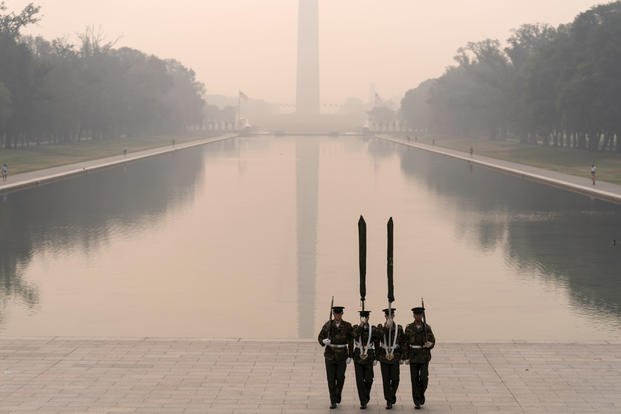As the eastern U.S. grappled with smoke from Canadian forest fires, the military across the region adjusted training or changed planned events to deal with the acrid air pollution.
Springtime winds carried the massive trail of smoke across parts of the continental U.S. on Wednesday and Thursday -- and directly over large military installations including the Army's Fort Drum, the Coast Guard Academy and the Marine Corps' Quantico training center, among others.
Wildfires in Quebec pumped a massive amount of smoke into the air, causing health warnings; overcast skies; and photos across social media of cities such as New York and Washington, D.C., shrouded in the smoky haze. While wildfires are not unusual in Canada during summertime, when the densely forested country dries and heats, they do not usually occur so early in the year or cause such heavy air pollution in the U.S.
Read Next: Green Berets Have Struggled for Years with Recruiting, Internal Data Shows
On Wednesday, the smoke was at its worst at Fort Drum, an Army installation in upstate New York near the Canadian border.
Base unit commanders canceled or adjusted training and physical fitness exercises, keeping with Drum's decentralized approach to unit and soldier health.
"Leaders at all levels are encouraged to monitor conditions and implement measures for the health of the force," said Lt. Col. Josh Jacques, chief of public affairs for the 10th Mountain Division.
Much of the smoke had cleared in that area on Thursday, and events had returned to normal. The 10th Mountain Division had no activities scheduled for Friday, when the weekend overlaps with an annual event called Riverfest, where soldiers and their families are encouraged to go out into the community and enjoy things like the St. Lawrence River.
A local 5K run called "Monument to Monument" was canceled by the city of Watertown, New York.
The smoke was heavy Thursday in Washington, D.C., where Joint Chiefs Chairman Gen. Mark Milley remarked on it during a National Defense University graduation held outdoors.
At Marine Corps Base Quantico, Virginia, the service had not mandated that any training be canceled or modified,said Capt. Michael Curtis, communication strategy and operations officer for the Marine Corps Installations Command-National Capital Region.
However, specific unit commanders had discretionary authority to alter or stop training based on conditions -- and some did, Curtis said. His own unit, he noted, had eliminated certain physically demanding elements from an outside training module the unit conducted Thursday.
Beth Baker, a spokesperson for Navy Region Mid-Atlantic, said via text that, while no naval installations had reported that the smoke disrupted operations, some outdoor activities may have been curtailed if air quality conditions warranted it.
At the Coast Guard Academy in New London, Connecticut, however, it was business as usual Thursday, with training continuing in spite of the bad air.
"The Coast Guard Academy's Corps of Cadets publishes a Plan of the Day daily, and none of those have been adjusted in response to the wildfires. All training and activities are proceeding as normal," according to the academy's public affairs office.
After noting that the Connecticut state government's air quality index for the day was "unhealthy" at 158, the public affairs office said that "the spread of wildfire smoke is an ongoing situation. CGA leadership will continue to monitor reports and make subsequent decisions accordingly."
The decision by various military units to curb outside activities tracks with alerts from various levels of civilian government this week. The smoke is more than just a nuisance; it can also be a health hazard, according to one medical expert.
"The degree of injury from what we inhale is a combination of the intensity, duration and type of exposure," said Dr. Maor Sauler, a pulmonologist with Yale School of Medicine's Department of Internal Medicine. "What's in the air now is a lot of fine particles that will cause inflammation and irritation. For people with chronic airway conditions including asthma, COPD [chronic obstructive pulmonary disease] and possibly exposure to toxic burn pits, it's a major concern."
President Joe Biden issued a statement highlighting the resources that the U.S. sent to Canada to help fight the wildfires, and calling on leadership in his cabinet to minimize negative effects from the smoke on the affected areas' economy and infrastructure.
The Weather Channel projected that the smoke, which it characterized as a "choking cloud," would continue to affect an area that includes Washington, D.C., and New York City through at least June 10. Without a change in the direction and intensity of the wind, forecasters did not expect to see a major improvement to air quality before then.
Sauler emphasized that, while the long-term consequences of exposure to the smoke will be negligible for most people, that short-term exposure would likely be uncomfortable, and for people with conditions that affect their airways, it could be serious.
"Smoke inhalation can cause inflammation, which leads to coughing, wheezing, chest tightness, and headaches," he said. It would be difficult, and the group of veterans who have health conditions that affect their lungs should be particularly cautious.
The VA said it had no data Thursday on whether its medical centers in the northeast were experiencing a greater than usual volume of patients over the past 24 to 48 hours, and specifically patients with breathing issues.
-- Konstantin Toropin contributed to this story.
-- Adrian Bonenberger, an Army veteran and graduate of the Columbia University Graduate School of Journalism, reports for Military.com. He can be reached at adrian.bonenberger@monster.com.
Related: A Navy Veteran Built New Technology to Aid Wildfire Prevention and Disaster Relief












